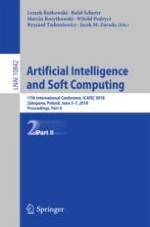2018 | OriginalPaper | Buchkapitel
An Efficient Prototype Selection Algorithm Based on Dense Spatial Partitions
verfasst von : Joel Luís Carbonera, Mara Abel
Erschienen in: Artificial Intelligence and Soft Computing
Aktivieren Sie unsere intelligente Suche, um passende Fachinhalte oder Patente zu finden.
Wählen Sie Textabschnitte aus um mit Künstlicher Intelligenz passenden Patente zu finden. powered by
Markieren Sie Textabschnitte, um KI-gestützt weitere passende Inhalte zu finden. powered by
